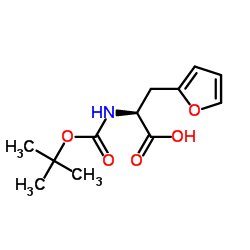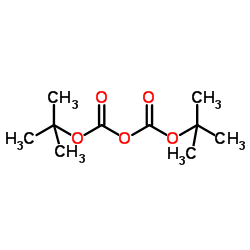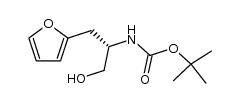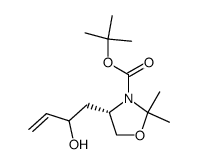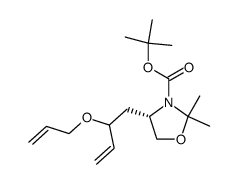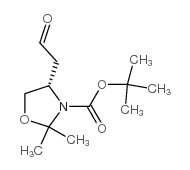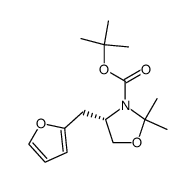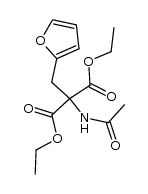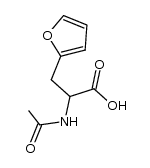145206-40-2
| 中文名 | N-叔丁氧羰基-L-3-(2-呋喃基)丙氨酸 |
|---|---|
| 英文名 | boc-l-2-furylalanine dcha salt |
| 中文别名 |
BOC-L-2-呋喃丙氨酸二环己胺盐
Boc-l-3-(2-呋喃基)丙氨酸 |
| 英文别名 |
N-(tert-Butoxycarbonyl)-3-(2-furyl)-L-alanine
BOC-L-2-FURYLALANINE-DCHA 2-Furanpropanoic acid, α-[[(1,1-dimethylethoxy)carbonyl]amino]-, (αS)- Boc-furan-OH (2S)-3-(2-Furyl)-2-({[(2-methyl-2-propanyl)oxy]carbonyl}amino)propanoic acid 3-(2-Furyl)-N-{[(2-methyl-2-propanyl)oxy]carbonyl}-L-alanine |
| 密度 | 1.2±0.1 g/cm3 |
|---|---|
| 沸点 | 406.4±40.0 °C at 760 mmHg |
| 熔点 | 406.4 °C |
| 分子式 | C12H17NO5 |
| 分子量 | 255.267 |
| 闪点 | 199.6±27.3 °C |
| 精确质量 | 255.110672 |
| PSA | 88.77000 |
| LogP | 2.13 |
| 外观性状 | 固体 |
| 蒸汽压 | 0.0±1.0 mmHg at 25°C |
| 折射率 | 1.505 |
| 储存条件 | 2-8°C |
Synonym: N-tert-Butoxycarbonyl-2-Furyl-L-Alanine. SECTION 2 - COMPOSITION, INFORMATION ON INGREDIENTS
Risk Phrases: None Listed. SECTION 3 - HAZARDS IDENTIFICATION EMERGENCY OVERVIEW The toxicological properties of this material have not been fully investigated. Potential Health Effects Eye: May cause eye irritation. Skin: May cause skin irritation.
Ingestion: May cause irritation of the digestive tract. The toxicological properties of this substance have not been fully investigated. Inhalation: May cause respiratory tract irritation. The toxicological properties of this substance have not been fully investigated. Chronic: No information found. SECTION 4 - FIRST AID MEASURES Eyes: Flush eyes with plenty of water for at least 15 minutes, occasionally lifting the upper and lower eyelids. Get medical aid. Skin: Get medical aid. Flush skin with plenty of water for at least 15 minutes while removing contaminated clothing and shoes. Wash clothing before reuse. Ingestion: Never give anything by mouth to an unconscious person. Get medical aid. Do NOT induce vomiting. If conscious and alert, rinse mouth and drink 2-4 cupfuls of milk or water. Wash mouth out with water. Inhalation: Remove from exposure and move to fresh air immediately. If not breathing, give artificial respiration. If breathing is difficult, give oxygen. Get medical aid. Notes to Physician: Treat symptomatically and supportively. SECTION 5 - FIRE FIGHTING MEASURES General Information: As in any fire, wear a self-contained breathing apparatus in pressure-demand, MSHA/NIOSH (approved or equivalent), and full protective gear. During a fire, irritating and highly toxic gases may be generated by thermal decomposition or combustion. Vapors may be heavier than air. They can spread along the ground and collect in low or confined areas. Runoff from fire control or dilution water may cause pollution. Extinguishing Media: Use water spray, dry chemical, carbon dioxide, or chemical foam. SECTION 6 - ACCIDENTAL RELEASE MEASURES General Information: Use proper personal protective equipment as indicated in Section 8. Spills/Leaks: Absorb spill with inert material (e.g. vermiculite, sand or earth), then place in suitable container. Avoid runoff into storm sewers and ditches which lead to waterways. Clean up spills immediately, observing precautions in the Protective Equipment section. Provide ventilation. SECTION 7 - HANDLING and STORAGE Handling: Wash thoroughly after handling. Use with adequate ventilation. Avoid breathing dust, vapor, mist, or gas. Avoid contact with eyes, skin, and clothing. Keep container tightly closed. Avoid ingestion and inhalation. Storage: Store in a tightly closed container. Store in a cool, dry, well-ventilated area away from incompatible substances. SECTION 8 - EXPOSURE CONTROLS, PERSONAL PROTECTION Engineering Controls: Facilities storing or utilizing this material should be equipped with an eyewash facility and a safety shower. Use adequate ventilation to keep airborne concentrations low. Exposure Limits CAS# 145206-40-2: Personal Protective Equipment Eyes: Wear appropriate protective eyeglasses or chemical safety goggles as described by OSHA's eye and face protection regulations in 29 CFR 1910.133 or European Standard EN166. Skin: Wear appropriate protective gloves to prevent skin exposure. Clothing: Wear appropriate protective clothing to prevent skin exposure. Respirators: Follow the OSHA respirator regulations found in 29 CFR 1910.134 or European Standard EN 149. Use a NIOSH/MSHA or European Standard EN 149 approved respirator if exposure limits are exceeded or if irritation or other symptoms are experienced. SECTION 9 - PHYSICAL AND CHEMICAL PROPERTIES Physical State: Viscous liquid Color: orange Odor: Not available. pH: Not available. Vapor Pressure: Not available. Viscosity: Not available. Boiling Point: Not available. Freezing/Melting Point: Not available. Autoignition Temperature: Not available. Flash Point: Not available. Explosion Limits, lower: Not available. Explosion Limits, upper: Not available. Decomposition Temperature: Solubility in water: Specific Gravity/Density: Molecular Formula: C12H17NO5 Molecular Weight: 255.27 SECTION 10 - STABILITY AND REACTIVITY Chemical Stability: Stable at room temperature in closed containers under normal storage and handling conditions. Conditions to Avoid: Incompatible materials. Incompatibilities with Other Materials: Oxidizing agents. Hazardous Decomposition Products: Nitrogen oxides, carbon monoxide, carbon dioxide. Hazardous Polymerization: Has not been reported SECTION 11 - TOXICOLOGICAL INFORMATION RTECS#: CAS# 145206-40-2 unlisted. LD50/LC50: Not available. Carcinogenicity: (S)-N-BOC-2-Furylalanine - Not listed by ACGIH, IARC, or NTP. SECTION 12 - ECOLOGICAL INFORMATION SECTION 13 - DISPOSAL CONSIDERATIONS Dispose of in a manner consistent with federal, state, and local regulations. SECTION 14 - TRANSPORT INFORMATION IATA Not regulated as a hazardous material. IMO Not regulated as a hazardous material. RID/ADR Not regulated as a hazardous material. SECTION 15 - REGULATORY INFORMATION European/International Regulations European Labeling in Accordance with EC Directives Hazard Symbols: Not available. Risk Phrases: Safety Phrases: S 24/25 Avoid contact with skin and eyes. WGK (Water Danger/Protection) CAS# 145206-40-2: No information available. Canada None of the chemicals in this product are listed on the DSL/NDSL list. CAS# 145206-40-2 is not listed on Canada's Ingredient Disclosure List. US FEDERAL TSCA CAS# 145206-40-2 is not listed on the TSCA inventory. It is for research and development use only. SECTION 16 - ADDITIONAL INFORMATION MSDS Creation Date: 1/16/2002 Revision #2 Date: 10/05/2004 The information above is believed to be accurate and represents the best information currently available to us. However, we make no warranty of merchantability or any other warranty, express or implied, with respect to such information, and we assume no liability resulting from its use. Users should make their own investigations to determine the suitability of the information for their particular purposes. In no way shall the company be liable for any claims, losses, or damages of any third party or for lost profits or any special, indirect, incidental, consequential or exemplary damages, howsoever arising, even if the company has been advised of the possibility of such damages. SECTION 16 - ADDITIONAL INFORMATION N/A |
| 上游产品 9 | |
|---|---|
| 下游产品 0 | |
| 海关编码 | 2932190090 |
|---|---|
| 中文概述 | 2932190090 其他结构上有非稠合呋喃环化合物. 增值税率:17.0% 退税率:9.0% 监管条件:无 最惠国关税:6.5% 普通关税:20.0% |
| 申报要素 | 品名, 成分含量, 用途 |
| Summary | 2932190090 other compounds containing an unfused furan ring (whether or not hydrogenated) in the structure VAT:17.0% Tax rebate rate:9.0% Supervision conditions:none MFN tariff:6.5% General tariff:20.0% |


